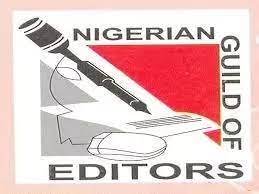- Law & Society
- No Comment
World Press Freedom Day: Guild Of Editors Task Incoming Government On Press Freedom

Nigerian Guild of Editors (NGE) has advised the incoming government “to initiate deliberate and sustained policies and programmes to promote freedom of expression, media freedom and safety of journalists.”
The Guild said there were “conscious efforts in the past few years by some members of the National Assembly – working in collaboration with officials of the executive arm of government, to criminalise journalism practice in Nigeria.”
The umbrella body of all the editors in Nigeria stated these in a statement yesterday to mark this year World Press Freedom Day.
The Guild also promised to engage the incoming government over the National Broadcasting Commission (NBC) Act and the Broadcast Code of Conduct – with the aim to amend and reform them to conform to the global best practices.
The theme of this year’s World Press Freedom Day, celebrated every May 3, is “Shaping a Future of Rights: Freedom of expression as a Driver for all Other Human Rights”, which the UN said signified the “enabling element of freedom of expression to enjoy and protect all other human rights.’’
In a statement signed by NGE President, Mustapha Isah, and the General Secretary, Dr. Iyobosa Uwugiaren, the NGE said “pluralistic mass media predicated on freedom of expression, freedom of information and free press is fundamental to any effective and functional democracy all over the world, stating that Nigeria can’t be an exception.
“We share the popular notion that freedom of the media is indispensable for the protection of all other human rights. Instances abound where inhuman treatments, torture, corruption, misuse of power, impunity and nepotism were exposed because of the reports by the media. Informing members of the public is often the first and essential step to begin remedying human rights violations and hold governments to account.
“Disturbing signs of repression, violations of media freedom and several cautious attempts to criminalise journalism practice, have been observed in the past few years in our country. There have been different forms of control, censorship, and pressure over the content of mass media in Nigeria, especially the broadcast stations, which have hindered their independence and pluralism.
“Cases of journalists who are deprived of their inalienable rights due to their work continue to occur over and over again. Cases of harassment, intimidation, violence – and even murder – have been documented in the past eight years – by both local and international pro-media rights groups’’, the NGE stated.
According to NGE “the case of two Nigerian journalists – Gidado Shuaib and Alfred Olufemi, who were recently convicted by an inferior court in Kwara State, ought not to have been charged, let alone convicted, for publishing an investigative report about a factory.”
The NGE also acknowledged what it described as “the media’s shortcomings,” stating that the professional body will continue to provide useful advice on the improvement of journalism profession.
